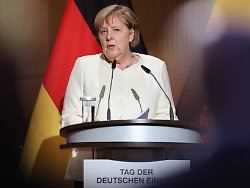Sunday, October 03, 2021
Clear words on Unity Day
Merkel: “Democracy is under attack”
On the day of German unity, Chancellor Merkel warns of “brutalization and radicalization” within society. It calls for people to work together again and again for democracy. At the end of her speech, she received a standing ovation.
On the Day of German Unity, Chancellor Angela Merkel urged the preservation of democracy in Germany. “Democracy is not just there, we have to work for it again and again,” said Merkel at the official ceremony for the Day of German Unity in Halle in Saxony-Anhalt. “Sometimes, however, I’m afraid we are a little too light-hearted with democratic achievements.”
“During this time we are seeing more and more attacks on goods as valuable as freedom of the press,” emphasized the Chancellor. “We experience a public in which resentment and hatred are stoked demagogically with lies and disinformation – without inhibition and without shame.” Not only are people defamed because of their appearance, their origins or their beliefs, “democracy is attacked”. Nothing less than democratic cohesion is currently under scrutiny.
Merkel also complained about attacks on people who work for the common good. She named paramedics, firefighters and local politicians. “The verbal brutality and radicalization that can be experienced there must not only be answered by those who fall victim to it.” Rather, they would have to be rejected by everyone. “Because verbal attacks lead to violence all too quickly.” Merkel referred to the murder of Kassel’s regional president Walter Lübcke, the attacks in Halle and Hanau or the murder of a 20-year-old in Idar-Oberstein, for which the alleged perpetrator had given his rejection of the corona measures as a motive.
People showed “real courage”
With a view to the peaceful revolution in the GDR in 1989, Merkel said that freedom “did not just fall upon us”. Rather, it had to be fought for. The people at that time showed “real courage”. There is still much to be done today. The design of the unit is not a “completed process”, said the outgoing Chancellor.
Merkel’s last speech on the Day of German Unity was acknowledged by the audience – including Federal President Frank-Walter Steinmeier and representatives of other constitutional organs – with sustained applause. The guests rose from their chairs.
After a peaceful revolution in the GDR in autumn 1989, the East German state joined the Federal Republic on October 3, 1990. Despite billions in investments and great strides in living together, incomes and pensions are still different in both parts of the country. In 2019, full-time employees in the eastern federal states earned on average just under a quarter less than in the western federal states, according to the federal government. The pension value should not be the same until 2024.
Big differences between East and West
Saxony-Anhalt’s Prime Minister Reiner Haseloff called for more efforts to bring people in Germany together. “There are still some major political differences between East and West,” said the President of the Federal Council in his address. That was shown recently in voting behavior in the federal election. In Thuringia and Saxony, the right-wing populist AfD had become the strongest party, while in the west it became weaker in many places and only had a single-digit share of the vote.
“That’s why we need projects and ideas that bring people together and unite the nation,” said Haseloff. Strong cohesion could also arise from the goals that the citizens of a country want to achieve together. “Under no circumstances should we allow ourselves to be played off against each other in these difficult times,” said Haseloff. “We have to have confidence in the future. And we have to draw the conclusions and lessons from the two German dictatorships without equating them.”
